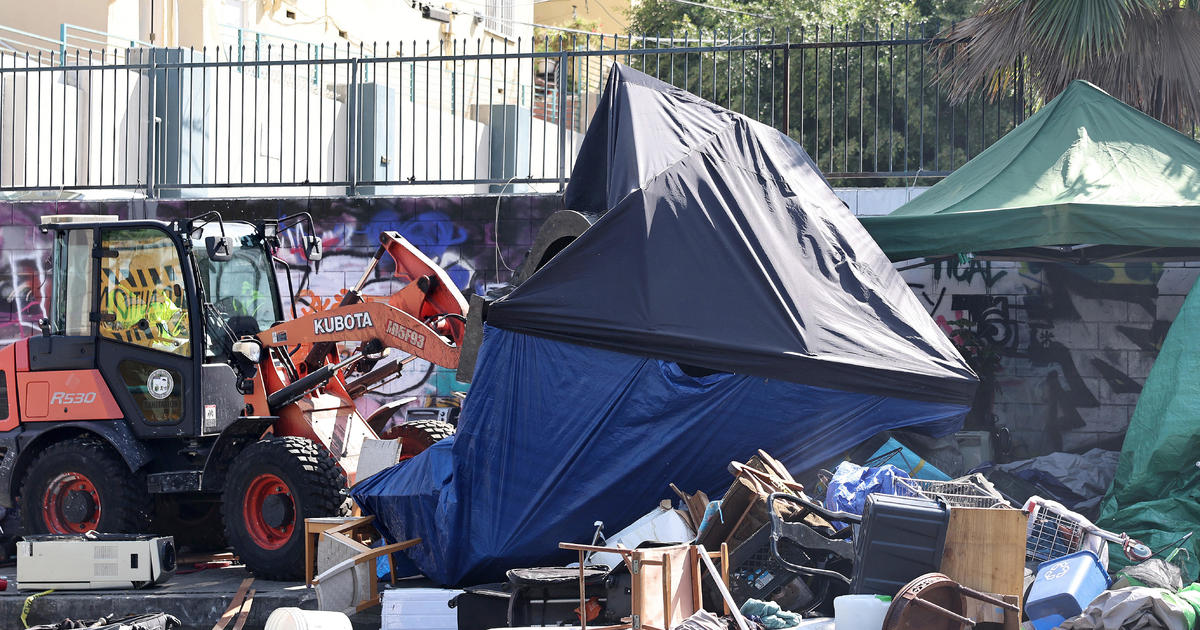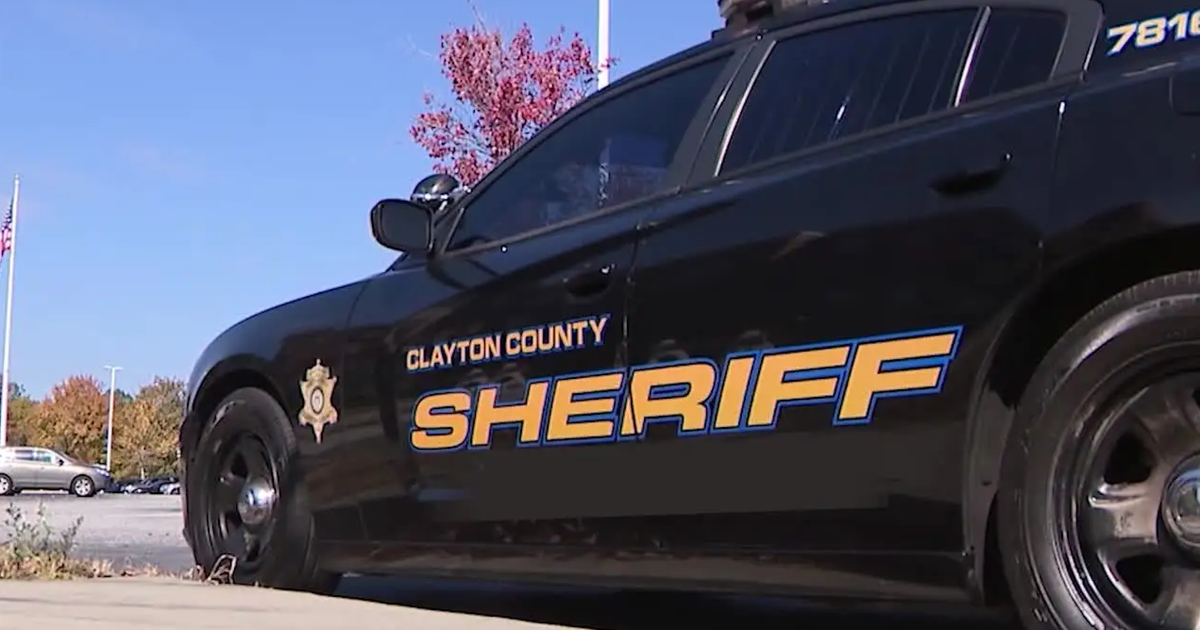Kindness Reunites 67-Year-Old Homeless Man With Birth Mother
HAYWARD (KPIX 5) -- Thanks to an act of kindness by an Alameda County Sheriff's Deputy, a 67-year-old man living on the street in the East Bay was recently able to meet his birth mother in a reunion 65 years in the making.
Have you ever walked around a homeless person or even crossed the street to avoid a homeless individual at all costs? Chances are you have seen someone like Mick Myers around your town, homeless and asking for change.
"Most of the people just hurry by and don't even give me a glance," said Myers.
But one day after repeat encounters with Myers, Alameda County Deputy Sheriff Jacob Swalwell had a serious talk with him.
"I had given him so many warnings," said the deputy, who multiple times had seen Myers and warned him about panhandling near a busy freeway on Foothill Boulevard in Hayward.
Swalwell asked him for his ID, but was stunned by the answer.
"And I asked him for his ID and he said he didn't have an ID. And I immediately asked 'Why don't you have an ID?'" recalled Swalwell.
At that point, the 67-year-old former truck driver and the 33-year-old deputy started up a conversation.
"He was not an alcoholic, he did not use drugs. He did not use tobacco," remembered the deputy.
The deputy asked Myers why he was not on social security.
"I said, 'I can't get it because I can't even get an ID,'" he explained.
"He was a senior citizen. I learned more that he was disabled and had been homeless for 30 years." remarked the deputy.
Myers still remembers what Deputy Swalwell told him.
"'Well, you've got somebody to help you now. I'm going to help you get your ID so you can get your social security and get off the street,'" recalled Myers about what would become a life-changing conversation.
Swalwell remembered at the time thinking the task would be an easy one. It turned out to be a major miscalculation.
Swalwell quickly found out getting Myers a new state-issued legal identification was anything but simple. The DMV no longer had any record of Mick Myers.
He had stopped driving trucks years ago and the DMV has purged any mention of him. To provide an new state identification card, the DMV had rules for Myers. He needed to bring a birth certificate and two forms proving California residency.
"How does a homeless person come up with two forms of residency?" asked the deputy.
In December, KPIX 5 featured a story about how the deputy helped Myers get a new state-issued ID. The Alameda County Sheriff's Department and the deputy's church pastor provided official letters, attesting to the fact that Myers lived in Alameda County.
Then the deputy helped to locate his birth certificate.
Myers had never seen it before. The document showed that he was born in Oakland at Highland Hospital. It additionally showed the names of his adoptive parents. While Myers knew he was adopted, he did not know about the circumstances.
"I didn't even know I was adopted until I was 16." he explained.
Myers grew up in San Leandro and went to Pacifica High, where he played in the high school's marching band.
But at home, Myers said he always felt rejected by his adopted siblings. He remembered how his adoptive mother showed him love, but said he felt shunned by the rest of the family.
When his parents died, Myers was cut off. Eventually, all his childhood friends passed away. At that point, he felt totally alone.
"I've been living a life as alone as a person could possibly be," said Myers.
But that was all about to change. His journey may have started under an overpass near an intersection in Hayward, but little did Myers know that the next stop for the 67-year-old would be discovering his birth mother was still alive.
A longtime private investigator with 25 years of experience, Mark Askins watched the KPIX 5 broadcast and read the stories.
"He kept saying, 'I'm lonely. I don't have anybody in my life,'" said Askins.
Askins volunteers for a nonprofit called Miracle Messages. The group's goal is to reconnect individuals experiencing homelessness with their long-lost loved ones.
"There'd always somebody in our lives who we think about as we fall asleep at night, on their birthdays." remarked the investigator.
Myers had always wanted to know what happened to his birth mother: was she even still alive? He knew his real last name was Oakley and that his birth mother's first name was Marie.
With Myers' blessings, Askins dug through old ledger books at the Alameda County Court House for information about any surviving relatives.
In a large, leather-bound canvas book, Askins had a "eureka" moment.
He showed KPIX 5 a list of cases and stopped near the bottom where he read two names.
"And here we have a case involving 'Wiley Albert Oakley' and a 'Marie Pauline Oakley,'" said Askins.
He wrote down the case numbers and had the clerk's office pull some old boxes containing microfilm with information on the cases.
There on the microfilm, he found some important clues about Marie Pauline Oakley.
In court papers, the details showed how Marie was just 16 years old when she ran away with a sailor from the Alameda Naval Air station. The couple married in Reno, and then headed to his family's home in the Smoky Mountains of Gatlinburg, Tennessee.
She then came home pregnant with a toddler in tow.
Her mother sought an annulment. The grounds for an annulment were clear in court records.
"Marie Oakley was not at the age of consent," said Askins, reading aloud from the old court papers.
Askins then employed a few other investigative tools in his quest to locate Marie. He was concerned, given Myers' age, that if he found Marie, she might not still be alive.
But he managed to locate a woman by that name, got a phone number and dialed it. A woman picked up the phone on the other end of the line.
About 300 miles north, in a seaport town in Humboldt County, Askins found Myers' birth mother: 85-year-old Marie Pauline Oakley, who calls herself Polly.
"I've often wondered what might have happened to him. But at the same time, I just assumed he had a good family, because that's what I had been told," remarked Polly.
Polly filled in some of the unknown, harrowing details of her journey.
"My life was not what I expected out of a marriage," recounted Polly.
Once relocated to Tennessee all those years ago, the teenage Polly found herself in dire circumstances. She soon became pregnant in a very unfamiliar world.
Her husband gave all his money to his mother and then left Polly alone for months at a time to lead surveying tours of the Smokey Mountains. She lived in an old shack in the mountains.
"The cabin was ramshackle. The cracks in the wall were so wide that snakes and other animals would come in," said Polly. The shack had no electricity or running water.
At 17, Polly gave birth to her first child.
"There was a bed for me to sleep in, but there was no crib for the baby. I had to put two chairs together and put a food locker on it, and wire up a lid so it wouldn't fall on him," she recalled.
Polly said she made sure that she and her newborn stayed indoors after dusk, because that was the time the mountain lions and the bears were active.
Polly had no money, and had to ask her mother-in-law for some of her husband's naval pay. But Polly was hit with a difficult reality: her mother-in-law would only give her enough money for formula, and only after Polly completed some back-breaking work for her.
She washed all the woman's clothes using a big galvanized tub and a washboard, filling it up with repeated trips with a bucket to the river, and heating the tub up over an open fire.
Polly also remembers getting so hungry that she stole vegetables from the neighbors' garden just to have something to eat.
She finally had enough. Polly called her mother back in the East Bay and asked her if she could please come home. When her mother retrieved her from the train station, her own mother did not recognize her thin and ragged daughter.
By the time she came back to the Bay Area, she was pregnant with a second child. That child was Mick Myers.
When Myers was just two years old, Polly said he got diagnosed with a life-threatening hole in his stomach. The little boy cried all the time, and could not put on weight. Despite working multiple jobs to make ends meet, she did not have the money to afford the surgery.
Oakley's mother came up with a solution. She told her daughter there was a family at church who were interested in adopting the little boy and convinced her that an adoption would be the best thing.
"My back was against the wall. I had to do what was best for him. I could have never afforded that surgery. I had no idea if he didn't get the surgery, would he die?" lamented Polly.
So when Polly heard that her second-born, youngest son was looking for her, she didn't hesitate. Polly told Askins that she wanted to see Myers.
"He's suddenly discovered he has family when he thought he was alone in the world. I have one more person to love." smiled Myers' birth mom.
First they connected by phone. The call took place at the Alameda County Sheriff's Department with Myers, Deputy Swalwell and Askins all present.
Swalwell dialed the phone. A woman answered the call and Myers uttered his birth name.
"This is David Charles Oakley," Myers said over the phone. Polly cried out, "My son!"
Mother and son chatted about their lives and agreed that they should meet in person. About two weeks later, for the first time in his life, Myers got on a small plane, piloted by a volunteer crew.
Swalwell and Askins came along for the ride.
They flew up in fair weather, though there was a threatening change in the forecast looming. The craft landed on a small airstrip in Humboldt County.
Myers got off the plane with a new guitar -- surprise gift from Deputy Swalwell -- and a high school year book that he wanted to show his birth mom.
Immediately Myers met some of his new extended family.
His niece Shannon came to the airport to provide transportation. As he walked off the tarmac, she greeted him and extended her hand.
"I'd be your niece," said Shannon.
Mick opened his eyes wide and said "Niece?"as he shook her hand.
Also present at the airport was Polly's third husband, Gary. He too welcomed his new stepson.
The trio of visitors piled into Shannon's car and off they went for a short drive to Polly's home.
Then, as Myers walked through the door, he saw his mother. She spied him and they hugged tightly for the first time in 65 years.
"Who'd have thought that something like this could have happened to anybody -- let alone me!" proclaimed Myers.
Polly ordered Deputy Swalwell to turn around.
"I want to see where your wings are, because you brought my son home to me," she told him.
Polly showed him family pictures on the wall and an album that included photos of him as a toddler that she had kept.
Myers also spoke to his older brother by phone. It was a quiet, intense call.
"Today has got to be overwhelming," said Polly. She observed that her long lost son had a lot to absorb.
Polly married three times, trained horses, and worked at Fairchild Semiconductor in San Jose. She is happily married with children, grandchildren and great-grandchildren.
She has always loved kids and takes pleasure in nurturing them and raising them. She is the original "Mama Bear." You don't want to cross her, when it comes to any of her relatives, especially the kids.
When she heard about Myers' struggles with his adoptive family and his subsequent homelessness, she felt terrible guilt.
"I just felt so sad that I'm thinking of all the things that I did with my other kids; all the experiences, that they had, things that they've done, the advantages that they had," Polly said, with sadness creeping into her voice. "And I felt so sad when he told me how he had been treated: like an outcast. Not physically abused, but basically emotionally abused, because he was not accepted."
Polly noticed that Myers had bit of an invisible wall set up around him. But she understood, knowing how hard it must be to be homeless.
Myers told KPIX 5 anchor and reporter Elizabeth Cook that, on the streets, he had to take steps to protect himself.
"When you live on the street, and you're alone, you're a walking target to bad guys," said Myers. "So I wear this ugly mask to hide the fact that I'm a person alone."
At the reunion, Mick began to relax and his face softened. As he and his mother kept talking, they started to hold hands. Myers picked up Susie -- the family's pug -- and fed her and another dog named Peanut some treats.
Myers was no longer alone.
"He didn't just get a mom! He had a whole family and they all descended him at one time," laughed Polly.
While mother and son had a lifetime to share with each other, time was short. The weather was quickly changing and the pilot had to fly home to the Bay Area.
But not before a new family photo in the backyard was snapped, with Myers holding little Susie in his arms.
"All this wondering all these years why this happened the way it did. What were the reasons why? What if and what now and what later? That all seems to have disappeared now," exclaimed Myers as he sat next to his mother.
She placed her hands on his arms and kept them there.
Before they said goodbyes, hugging twice, everyone involved came away with some simple truths.
"It has opened my eyes to others in Mick's situation," said Swalwell.
"All of us is family, all of us is somebody's someone." said private investigator Askins.
And finally, Polly stood with her hands holding onto her son's arms and looking straight into his eyes.
"To have you puts a piece of my heart back, and means the world to me," she said to him.
They're already discussing the holidays. Polly has an extra bedroom and offered Myers a place to live. But she knows he has a lot to think about before he makes any decisions.
The Deputy Sheriff's Association of Alameda County was so moved by Myers' story -- spurred by Deputy Swalwell's random act of kindness and Mark Askins' hard work in locating Mick's birth mom -- that the group was inspired to help.
The Association provides assistance for the underprivileged in Alameda County. Members of the nonprofit witnessed how the deputy and homeless man were able to connect on a deeper level as human beings.
The group has set up a campaign to raise money to help Mick and others experiencing homelessness. Money raised will help pay for food, clothes, housing, education and treatment. Anyone can make a tax-deductible donation in Myers' name.
Interested parties can find more information and give funds at the foundation's website. They are accepting donations, cards and letters for Mick Myers.
As for Miracle Messages, Myers joins a growing number of success stories. In three years, volunteers have reconnected 110 individuals who are homeless with family members.
As for Myers, he is now on Medi-Cal and has applied for social security.
Bottom line: anyone can help. Sometimes, all it takes is a random act of kindness.






